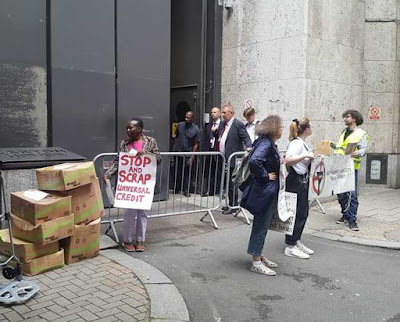Disabled
People against the Cuts (DIPAC) and the Kilburn Unemployed Workers Group were
out in force outside the headquarters of the Department for Work and Pensions
(DWP) in London last week. They leafleted passers-by and handed in thousands of Metro newspapers in big boxes
addressed to Amber Rudd to complain about the lying advertisement on Universal
Credit it ran for nine weeks.
The DWP advert claims to “set the record
straight” on “myths” surrounding Universal Credit, stating: “A lot has been
written about Universal Credit recently – not all of it correct, sadly.” But
the four-page adverts in the Metro,
a free tabloid newspaper largely given away on London’s bus and train services
system, were
dismissed as “propaganda” and an “insult to all disabled people” by campaign
groups when they came out last month.
The Disability Benefits Consortium (DBC),
a coalition of more than 80 disability charities, has now lodged a formal
complaint to the Advertising Standards Authority (ASA) about the ads, which
they said were “deliberately misleading” and contained “obvious exaggerations”.
The government claim that Universal Credit
supports you if you are on a low income or out of work. Given that disabled
people are struggling to get by on Universal Credit, to claim it works is, at
best, simply misleading.
The DBC recently surveyed around 500
disabled people about their experience of Universal Credit. The survey
highlighted some serious concerns and deeply worrying findings. The majority of
respondents who moved from Employment Support Allowance (ESA) onto Universal
Credit said they now get less or a lot less money than they did previously.
People told us that the impact of having less money includes struggling to pay
for food (70 per cent), driving a significant number of people to food banks
(35 per cent) and a worsening of people’s health, in particular their mental
health (85 per cent), and most worryingly driving people to consider suicide.
The ads cane out at the same time as a
report by UN Special Rapporteur on extreme poverty Philip Alston that said the
scheme was “fast falling into Universal Discredit”.
Ann Galpin, chair of the National Union of
Journalists (NUJ) disabled members’ council, described the campaign as
propaganda and said: “We are appalled that these misleading wraparounds and
features have appeared in the Metro
Kilburn Unemployed Workers believe that
together we are stronger. By standing together we can defend our rights and win
changes that everyone wants. They hold regular meetings and picket the Caxton
House HQ of the DWP on the first Friday of every month from 12 noon. Their
campaign is supported by Brent Trades Council, the representative body for
trade unionists in Brent.

No comments:
Post a Comment